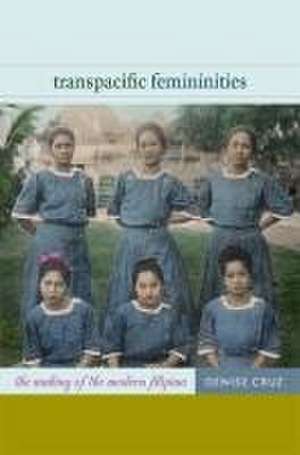Transpacific Femininities – The Making of the Modern Filipina
Autor Denise Cruzen Limba Engleză Hardback – 18 noi 2012
Preț: 667.50 lei
Preț vechi: 730.99 lei
-9% Nou
Puncte Express: 1001
Preț estimativ în valută:
127.73€ • 133.69$ • 106.31£
127.73€ • 133.69$ • 106.31£
Carte indisponibilă temporar
Doresc să fiu notificat când acest titlu va fi disponibil:
Se trimite...
Preluare comenzi: 021 569.72.76
Specificații
ISBN-13: 9780822353003
ISBN-10: 0822353008
Pagini: 320
Ilustrații: 14 photographs
Dimensiuni: 166 x 243 x 26 mm
Greutate: 0.59 kg
Ediția:New.
Editura: MD – Duke University Press
ISBN-10: 0822353008
Pagini: 320
Ilustrații: 14 photographs
Dimensiuni: 166 x 243 x 26 mm
Greutate: 0.59 kg
Ediția:New.
Editura: MD – Duke University Press
Recenzii
"Offering elegantly written, provocatively framed, and meticulously analyzed historical and cultural accounts of Filipino modern feminine formations between the early twentieth century and the years immediately after the Second World War, Denise Cruz fills a gap in the scholarly literature by boldly asserting the primacy of transnational connections." Martin F. Manalansan IV, author of Global Divas: Filipino Gay Men in the DiasporaTranspacific Femininities is really quite extraordinary. By sustained critical attention on the figure of the transpacific Filipina, Denise Cruz tells a story that not only returns deep and irreducible complexity to the women and women writers whose lives and work create a network of affiliations and intimacies across the Pacific, but that also shows us how vital gender was and is to apprehending the incredibly complicated interrelations among the histories, cultures, and politics of the Philippines, the United States, and Japan. Where many are apt to declare the significance of empire, race, nation, and gender, Cruz shows their linked importance. Amazingly, she does so by taking her readers through as varied grounds as the emergence of English-language literary cultures in the Philippines, to the shifting deployments and meanings of femininity across the writings of authors who are sometimes conservative, sometimes transgressive, and always illuminating, without confining the Filipina to a singular narrative. We learn a great deal about the circuits of signification, desire, and empire that constitute twentieth century histories of the Pacific." Kandice Chuh, author of Imagine Otherwise: On Asian Americanist Critique
Cuprins
Acknowledgments ix
Introduction. Transpacific Filipinas, Made and Remade 1
1. Cartographies of the Transpacific Filipina 31
2. Nationalism, Modernity, and Feminism's Haunted Intersections 67
3. Plotting a Transpacific Filipina's Destiny: Romances of Elite Exceptionalism 111
4. New Order Practicality and Guerrilla Domesticity: The Pacific War's Filipina 149
5. "Pointing to the Heart": Cold War Makings of the Transpacific Filipina 185
Epilogue. Transpacific Femininities, Multimedia Archives, and the Global Marketplace 219
Notes 237
Bibliography 261
Index 283
Introduction. Transpacific Filipinas, Made and Remade 1
1. Cartographies of the Transpacific Filipina 31
2. Nationalism, Modernity, and Feminism's Haunted Intersections 67
3. Plotting a Transpacific Filipina's Destiny: Romances of Elite Exceptionalism 111
4. New Order Practicality and Guerrilla Domesticity: The Pacific War's Filipina 149
5. "Pointing to the Heart": Cold War Makings of the Transpacific Filipina 185
Epilogue. Transpacific Femininities, Multimedia Archives, and the Global Marketplace 219
Notes 237
Bibliography 261
Index 283
Notă biografică
Descriere
Shows how the complex interplay of feminism, nationalism, empire, and modernity helped shape conceptions of the transpacific Filipina








